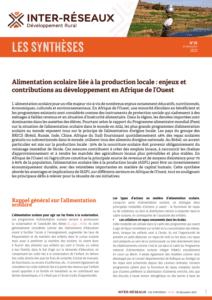Special issue on EPA’s
This issue of Grain de Sel (GDS) is indeed special on several counts … First of all, there are a total of 40 pages dedicated to a single subject. Secondly, it includes an eight-page supplement jointly published with the Network of farmers’ and agricultural producers’ organisations of West Africa (ROPPA), presenting the position of farmers’ organisations from five ACP regions. The whole issue is published in French and English and will be widely circulated. Finally, this issue is special because it has mobilised many international partners. Two editorial committees met to design and write it, one in Ouagadougou, in February 2007, and the second in Paris, in March. More than twenty people participated in these meetings (cf. list below). As usual, Grain de sel would like to contribute to the debate in a special way, by offering you a comprehensive set of historical, contextual and analytical data, to help you understand the issues at stake. While the different viewpoints and concerns are presented and the alternatives discussed, this issue does not seek to defend any position. Its aim is to allow everyone to have a clearer understanding of the problem and to form an objective opinion.
Editorial
Editorial: EPA: Beyond Trade
Freddy Destrait
Introduction
[->4628]
Roger Blein
The Cotonou agreement is deeply rooted in the decolonisation of Africa. More than 40 years after this process, the agreement retains the same hopes and ambitions, but also the ambiguities.
The Guest Speaker
[->4629]
Edgard Pisani talks about his vision of the relationship between the European Union and the ACP countries. His is an uncompromising account of the situation, imbued with wisdom.
Part 1: Historical Context
Before EPAs, a system that was hardly conducive to agricultural development in ACP countries
Vincent Ribier, Roger Blein
From 1975 until 2000, the Lomé Conventions governed ACP-EU relations. Non-reciprocal tariff preferences were supposed to help development in ACP countries, in particular agricultural development. Yet, when time came to appraise these policies, the outcomes were disappointing.
[->4630]
Kalilou Sylla
Why was a reform of the trading system needed? While non-compliance with international trade rules is often mentioned as the main reason, there are other elements that explain the need for reforms. This article outlines the various reasons. The interviews published on pages 13-14 throw additional light on the debate.
[->4631]
[->4632]
Interviews with Hakim Ben Hammouda and Bernard Petit
Hakim Ben Hammouda of the Economic Commission for Africa wonders how two regions which are so different, can be put on an equal footing. Bernard Petit, from the EC, considers that good economic governance, regional integration and better use of aid should be coupled with trade preferences.
Part 2: Objectives and Principles
The Cotonou Agreement: across-the-board reform of ACP-EU cooperation
Quentin Stoeffler with the contribution of Sanoussi Bilal
In signing a new cooperation agreement in Cotonou, on 23 June 2000, the ACP countries and the European Union wanted to break symbolically with the series of Lomé conventions. The Cotonou Agreement constitutes a major watershed in ACP-EU cooperation. What are the main changes and innovations?
[->4633]
Olivier Consolo, Ingrid Kersjes
People do not agree over the Cotonou Agreement. For some it is a true cooperation framework, others think it is a text devoid of principles. An interview with Olivier Consolo, CONCORD Director and Ingrid Kersjes, from the Netherlands Ministry of Foreign Affairs.
EPAs: The principles are clear, the substance is subject to negotiation
Roger Blein
The EPAs are first and foremost free-trade agreements, which are reciprocal but asymmetrical, between each ACP sub-region and Europe. What are the outlines of the new trading system, the main innovations and points for negotiation? An overview of the main key points.
Measuring the impact of EPA on sensitive products
Bio Goura Soulé
Trade liberalisation will neither be complete nor immediate. Some products will remain protected because they are strategic for ACP’s economies or will be liberalised later, when the agrifood chain is more competitive and able to stand up to EU competition. An insight into the choice of these “sensitive” products for West Africa.
Special products, sensitive products and safeguard mechanisms
Anne Wagner
The WTO should allow developing countries to choose a list of special products. This is the equivalent of sensitive products under the EPAs. At what stage is debate on sensitive goods and safeguard mechanisms within the WTO and what are the connections between the two negotiations?
Protecting sensitive products and the tools to do so
Vincent Fautrel
Among the numerous free-trade agreements that the European Union (EU) has signed with various countries and regions, none of them stipulates a full liberalisation of all traded products. Therefore, the different agreements provide various examples of how sensitive agricultural products can be protected, which could be useful to the ACP countries.







